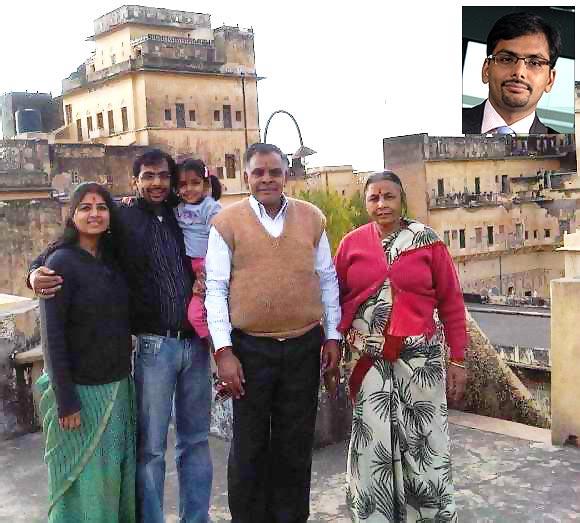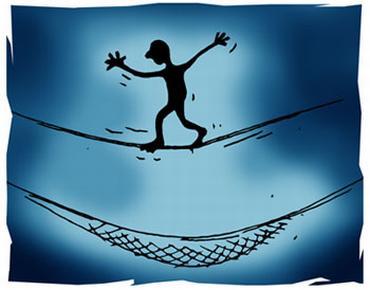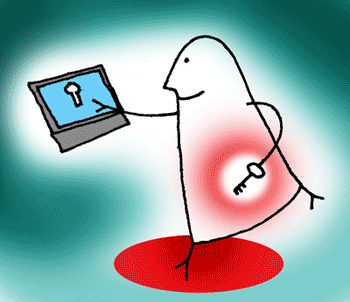
From somebody who could not speak good English to becoming the president of Edelweiss Securities, Vikas Khemani speaks about the qualities that make leaders and achievers.
When Vikas Khemani, then in Class VI, moved from Mandawa, a town in Rajasthan's Jhunjhunu district, to Surat in Gujrat, with his family, little did he reckon that his life would never be the same again. When he moved to Mumbai after graduation to study chartered accountancy, he knew what he wanted to do in life.
But then there was this huge complex -- of not being a good speaker of the English language -- that had to be overcome. So when he landed in Mumbai as a commerce graduate from South Gujarat University to pursue CA and CS (company secretary-ship) life began to teach him some important lessons.
Lessons that would make him cry.
Lessons that would make him tighten his belt, sharpen his observations, and through steady but determined self-learning sessions take him to the pinnacle of his career.
Lessons that catapulted Vikas Khemani at 34 as the president, co-head wholesale capital markets at Edelweiss Securities.
Vikas spoke with Prasanna D Zore at length about his inferiority complex, the efforts he took and strategies he followed to overcome his fear of spoken English and career dos and don'ts for those who would one day want to step into his shoes.
Were you always determined to become a chartered accountant?
As a person I was always interested in commerce, in business. As a child I used to help my grandfather in his business in Mandawa -- my grandfather was a cloth merchant. During Diwali I'd buy firecrackers from wholesalers and sell it in our locality and make some money to buy crackers for myself. Not that my grandfather or parents did not give me money but I wanted to earn my own money to spend during Diwali.
I don't know why but I always wanted to be independent.
I did not think of CA in those days but I always had an eye for the corporate world. As a child whenever I'd see industrialists like (the late) Aditya Birla (and the founder of Aditya Birla group) or Ratan Tata, I'd get glued to the TV and watch them speak. I always had this feeling that one day I have to move there (be a part of the corporate world).
One day I came to know from a programme on TV that one could do chartered accountancy after Class XII. I was just about to complete my Class XII and I thought I should also apply for it. I thought let me sign up for this programme through correspondence and that's how I did my foundation programme. Inter followed later.
What was so attractive about the corporate world to you as a child?
I always wished I were there (amongst big corporate) when I saw the likes of (the late) Aditya Birla and Ratan Tata on TV. I always desired to fly high and do big things. While I started my CA in Surat, I never got that kind of environment there. So one fine day I told my father I wanted to go to Mumbai. My father was kind enough to encourage me knowing well that I'd be on my own in Mumbai.
In Mumbai I stayed in a hostel Rajasthani Vidyarthi Graha in Andheri West meant only for CA students.
I did my article from Lodha & Co, a fairly large chartered accountancy firm. A lot of people helped me in Mumbai; I owe a lot to them. My communication skills were very poor. I was a very shy guy who would not interact much with people. It was a different world altogether in Mumbai.

So what were the challenges you faced in the city coming from Surat? Was it a cultural shock for you?
Oh yes. As a child I had limited exposure to the world at large. It was the first time that I had stepped out alone on my own. When I walked into the hostel there were 400 students; it was real exposure to the outside world with people having their own personality and traits. So there I was all alone trying to manage things, build relationships with other students.
There were students who were extremely intelligent, knowledgeable, polished, influential, well-to-do and there I was with poor communication skills, hardly spoke English, an under confident guy who would hardly talk to anybody. When I would go for interviews for my articleship I was always conscious about my dressing style because I did not know how you dress in the corporate world. Mumbai culture is quite different from how you dress in Surat's business environment to say the least.
But slowly you have to learn these things and change yourself. There was nobody to guide me about what was right and what was wrong.
So, how did you overcome this complex of not speaking good English?
Trust me it was a big challenge. You go through a huge amount of pain internally. But as long as...
One painful incident...
(Laughs heartily) I think there are many such (incidents) (breaks out laughing again). I had gone for an interview somewhere... a very big firm... a friend of mine helped me there (he later remembers the firm as Arthur Andersen;)... I was very lucky to get an interview opportunity because I knew for sure that people with my background would not even reach the interview stage. There (during the personal interview) I couldn't speak in front of the partners because I was very under confident. Whatever I spoke made no sense at all.
I lost a big opportunity at that point in my life but that was really the turning point for me.

Did you get selected?
No I did not.
How did you react then?
Obviously, you come back and cry. You feel low...
You cried?
Yeah, yeah, yeah. I have cried many times in life. You are helpless sometimes but you still keep trying to change things for good. It does not happen in a single day. It takes consistent effort for years together to learn and polish your skills that you lack. Finally, I joined Lodha & Co which had a very homely culture, professional but yet they could accommodate your weaknesses and help you hone your skills as a CA while doing articleship. I sort of gelled well there.
(Coming back to answering how Vikas overcame his fear) One thing that I always found -- I don't know how it came about -- that there is no substitute to self-learning. Whenever I would see somebody acting in a particular manner that made a good impression on me or on others, I would put myself in that situation and imagine how I would have behaved in that very situation. If I learnt there was a big difference then I would change myself for the better.
That self-correcting methodology has always held me in good stead. I'd read newspapers loudly in front of the mirror, note down words that I found difficult to pronounce or understand and refer to them in a dictionary for pronunciation and synonyms.
During travel time to office I'd read every newspaper, observe people who spoke English in the train and check how I could improve upon it.

Tell us about your first successful job interview?
It was at ICICI Securities. I always wanted to be in the capital markets. During my college days, I used to invest my fathers' money in IPOs and markets and lost a lot of money during the Harshad Mehta scam. But I always wanted to be in the corporate world and deal with money. After graduation, I first applied in ICICI Securities, but got rejected.
So I equipped myself with more knowledge about markets and applied a year later again to ICICI Securities.
This interview at I-Sec is where I think I was well prepared and I managed to impress the interviewer about my subject knowledge and they gave me the job.
Your first job experience...
Frankly speaking it (ICICI Securities) was a very professional environment; it had very, very talented people from reputed IIMs and I was like a minnow in front of them.
Did that give you a complex?
Absolutely. Huge complex! A: I could not speak English well; B: They were so smart, sharp and confident that if ever I was made to speak in a group I would think I'd rather die. And those kind of things would happen very often. But for the first year my job was in the mid-office and I really enjoyed it there.
My boss, though a taskmaster, helped me overcome my fears and so did my colleagues. But I think what really helped was self-learning by observation: constantly looking at people and learning. That's the reason I believe what company you keep matters.
You would face disappointments lot of times but I somehow had that positive attitude to overcome obstacles. A lot of times you make a fool of yourself in meetings, during conversations and then you go back and reflect over it, find out your gaffes, promise yourself not to commit those mistakes again and move on.
How did your career progress after ICICI Securities?
Edelweiss is my second job (smiles... Vikas has been in this company for over 10 years now).
At ICICI Securities the environment started changing, the original team I was working with changed, and so I moved on to Edelweiss Securities a small company then. I knew Naresh Kothari and Rashesh Shah. I met them once. They told me about their vision for the company and asked me to come on board. I bought into their vision; at heart I was really very entrepreneurial, hence may be it appealed to me.
I always wanted to do something very big.

Tell us about your biggest challenge at Edelweiss Securities when you began working with them...
Around the time I came here (to Edelweiss), equity derivative was coming up in Indian markets and was a very new area. I was managing small clients portfolio in derivatives and wanted to start broking for FIIs in derivatives and it was new area. It took me nine months to convince colleagues, seniors and people around me that this (the derivatives business) is a big opportunity and we should invest in it.
While I joined Edelweiss after three/ four years of job experience my communications skills were still underdeveloped. I was still shy of speaking in a group and then the business I wanted to venture into was also new; Edelweiss then again was full of smart and bright people and there was always that fear of people quickly putting you down.
It was very tough to overcome these fears in the first year at Edelweiss. But my confidence started building up once the derivatives segment was up and running and I could help the company generate revenues.
All through this interview you have been talking only about your lack of communication skills, your negatives. I am sure there must have been great qualities too that the likes of ICICI Securities and Edelweiss saw in you to hire you. Let's talk about those good qualities...
(Hesitates for want of words and then)... When I met Rashesh I feel he saw my ability to see the big picture. I have always had bigger ambitions and aspirations. Anyone can figure that out by interacting with me for half an hour. I think these companies looked at me as a 'big vision guy'.
The other good quality is my execution capabilities. Once I envision a plan or a business opportunity, I get it done, take it to its final stage overcoming all the hurdles.
Thirdly, and most importantly, I have a very positive attitude of looking at challenges. No matter how good you are, no matter how good the environment around you is, in your career journey you are bound to face some setbacks. In such a situation it is your ability to deal with these setbacks and disappointment and your attitude towards them that makes you stand out in the crowd.
Given a problem I have always focussed on the solution, not the problem.

What values did you grow up with as a child?
Like all middle class parents, through their actions and deeds, my parents always taught me to live within my means. Don't overspend, have fun with what you have, but live within your means.
That has helped me maintain a very fine balance in life. That helped me realise that one doesn't have to do much to fritter away success and achievement and it is very easy to get bogged down by obstacles in life.
I believe, most middle class family children grow up with this attitude and work hard to achieve what they want in life. I think a lot of these values apply to businesses also.
So, was your father upset with you when you lost money during the Harshad Mehta scam?
I wouldn't know that. Even if he were he didn't show it. Obviously, he must have been upset, but I don't know why he always showed immense faith in me and it is that faith that has helped me come along good in my life's journey.
He didn't even, for once say that I lost so much of his money. But that lesson has helped me to build my understanding of capital markets and value of protecting capital.
How much was it?
Oh, I lost money to the tune of Rs 5 to 6 lakh and in those days (1992) it was really big money. A big tuition fees for my entry into capital market.
Now that you have made a name for yourself do you think you have made your parents proud?
I hope so (smiles).
I mean have they never said it?
Typically in most marwari families these things are not spoken. You have to feel that moment in the eyes, emotions and actions of your parents. I have witnessed those moments many times. But never had anybody come to me and said so in as many words.
But I must say that I have been blessed with a wonderful family and have got huge support from my parents and wife Swati all along for making me successful. My family, my parents and Swati have made so many sacrifices and without their support nothing would have been possible.

During your interactions with clients and industry participants do you go with a feeling at the back of your mind that 'I don't speak good English and I may not make a good impression on them because of my communication skills'? Or do you go to meet them with the confidence that if you have great ideas then communication, though important, does not matter much?
Absolutely. I think that is what has undergone a significant change in the last four to five years, especially after I assumed leadership roles.
I don't think I have an inferiority complex any more. Obviously I am not a great public speaker but I can handle interviews, group discussions, client meetings and business presentations very well.
I have learned that the core of communication (any form whether meeting/interview/presentation) should always be focussed around its objective and effectiveness can always be improved with delivery, form and other softer aspects.
So you don't believe that those who cannot speak polished English do not succeed in life?
Absolutely. Good communication skills do not mean that you have to speak polished English. And you learn that late in life. Early in your career you think that good communication skills is equal to speaking polished English. But that is absolutely not the case.
The fact that I was able to communicate my ideas and plans to my prospective employers even when I was not good at speaking English says a lot... that was also communication, right?
But those who lack good communication skills should learn them as they rise up the ladder. Self-correction and self-learning are the best methods with which you can keep improving your communication skills.
I still remember in the early days when I would go for interviews on business channels I would come back after the interview and analyse my mistakes and tell myself that I will not repeat those mistakes.
Like I had the habit of speaking very fast but I improved upon it by consciously trying to speak slowly and in a calibrated manner so that the other person can comprehend what I am saying.
Your advice to India's youth...
My only advice is you must have passion in whatever you do. Many young people, given today's environment, get carried away with immediate material gratification. If you walk on this path, your career will get harmed in the long term. So work towards achieving your long-term vision.
Nothing is impossible if you have the dedication to achieve your goals.
Your birthplace, your family background has no bearing on how much successful you will be. You are only limited by your own thoughts and vision.
Career dos and don'ts...
I have seen many people when they begin their career and join an organisation their only focus is what is in it for me? When you focus on this attribute of your job you don't offer your 100 per cent to the job at hand.
My only request is give your 100 per cent and leave the rest to your organisation and destiny. Because if you do your work to the best of your abilities whatever is due to you will come to you.
Taking career decisions based on how much you are earning today or how much you will earn tomorrow is not the best of things to do. Think of what will give you happiness at work. Very often, people sideline the happiness quotient of doing a job.
Your ability to learn and grasp ideas is the only thing that will keep you updated.
Learnability doesn't have to be only about your subject of interest. It can be around your personality, your organisation, your environment etc.
Constantly widening your perspective about various facets of life/business/society/world is very important. According to me people with high learnability do very well in life.